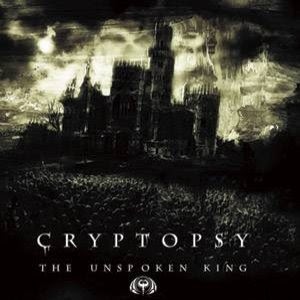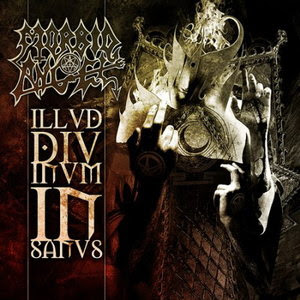Since that time, however, the black metal scene has diversified so much that it is no longer helpful to think of the genre in terms of waves. Rather, specific sub-styles have developed within the (already obscure) genre, often associated with a specific geographical area. French black metal tends to be the most cerebral, with bands like Blut Aus Nord and Deathspell Omega producing some of the most mind-boggling music this side of John Cage, while German black metal tends to be straightforward and raw. In recent years, one particular style of black metal has risen to my attention; one that originated in the Pacific Northwest. This particular brand of black metal has been called "natural black metal" and "tree-loving-hippy metal" (okay, maybe not that), because instead of the typical frozen landscapes that traditional black metal evokes, the tremolo-intense riffs of this style of metal calls to mind the rain-drenched forests of Oregon and Washington. These musicians are more likely to sing about Mother Nature than Father Satan, and although they still are interested in the pagan, it's more for their connection to the world around them than for their blood sacrifices to devils.
These three bands fall roughly into this style of metal. One of them is actually one of the founding voices of this style, and although the other two are not strictly Northwest American black metal (one band is from Ireland, and the other Brooklyn), they share more in common with each other than with Darkthrone and Bathory, although they surely owe them a debt.
Krallice - Diotima
Art: 5/5
Krallice is far and away the most pretentious band I've heard all year. It has been said that Krallice does not play black metal, but rather what NYC hipsters think black metal sounds like. Which is true, but over simplistic, since these particular hipsters actually happen to be correct in their assessment of black metal. All that means is that this is an album produced to a form—not a cookie cutter mold that produces an easily digestible product, but a structure, like the rules for a sonnet. That form involves copious tremolo picking and blast beats. In fact, nearly every guitar note on Diotima is tremolo picked, leaving you to wonder how on earth guitarists Colin Marston and Mick Barr ever manage to play a live show. Even in the studio, the task is ferocious, for the average track length is a nice 12 minutes. The result is a swirling hypnotic mass of sound. Diotima is a culmination of the sound exploration Krallice has been doing for the past three years, bringing everything into one bleak, tortured soundscape. This is an album meant to be spun on vinyl while wearing tight jeans and a keffiyeh, sipping on a PBR. With lyrics like "Inside every man is a beast, a perfect animal of
Self-advancement/Unthethered by conscience," Krallice has constructed a nihilistic cultural statement made concrete through the blasting of drums and the swirl of guitars—a musical expression of the OWS generation. There's no pretty nature here—just the roaring of the wind
Grip: 4/5
Here is where Krallice stretches itself. Because most of the songs are twelve minutes long and do not adhere to any traditional song structure, and instead are built around a series of intertwined tremolo guitar parts, Diotima is by no means an easy listen. Some may never pierce its shell, and hear only a bunch of self-absorbed guys in their mid-twenties creating a parody of something that shook the world twenty years ago. But if that's all you get out of Krallice, you're either too old or too set in your assumptions (or quite likely both). The drums are driving and the riffs infectious. The guitars screech and swirl over the growl of the bass. The raw production of Diotima uses just the slightest amount of reverb to blend the sounds together. The sound is truly remarkable, and if experienced in the correct way, is a powerful tool to drive home the philosophies and ideas of today's young and disillusioned. Whether or not Krallice will be able to stay relevant with time remains to be seen, but they are undoubtedly a band of their times.
 Wolves In The Throne Room - Celestial Lineage
Wolves In The Throne Room - Celestial LineageArt: 5/5
Washington natives Wolves In The Throne Room are one of the originals of this particular movement of black metal, and also one of the best. Their sound is one of green nature and grey rain. When you listen to a WitTR album, you can feel the moss under your feet and smell the forest. If somebody told you that the Weaver brothers, the only two "members" of the band (although the album features eight guest musicians), did nothing but stand in an enclave in the forest holding candles and chanting in low voices, you would absolutely believe it. On Celestial Lineage, that natural feeling is more present than ever before. Ever since 2007's Two Hunters, WitTR have included ambient clips of rain and forest sounds in their albums to help set the tone for the music, but on Lineage they are integrated into the music in a way that few metal bands achieve. The use of subtle synthetic pads as well as piano and chimes fills out the sound while a haunting female voice chants poetry, and for most bands, there would be a specific cut-off point where you could say "now the metal begins," and after a first listen, you would skip the intro track from then on. But not so with Wolves in the Throne Room.Tremolo guitars surge into existence, Aaron's skillful drumming rushes in, and Nathan's tortured shrieking replaces the female chanting, and it all feels like one complete piece—a seamless transition. This level of control is rare in metal, and it comes from having a focused message and a specific delivery. The pads, chanting, and chimes continue to make their appearances throughout the album, appearing alongside distorted chords and esoteric drumming.
Grip: 4/5
It's hard to tell which parts of the album are more compelling—the full-on black metal assault or the expansive chanting sections. Both are put together superbly, and Celestial Lineage receives the best production I've yet heard on a WitTR album. Everything is warm and rich in analogue tone, with guitar tone so good you can barely tell when a note is being tremoloed and when it's just rich, fuzzy sustain. The drums lack the harsh edge they enjoy on Diotima, and the vocals are the reverb-drenched "demon yelling from the mountaintop" style that has become so popular in this blend of black metal. With alternate instrumentation ranging from pipe organs to Celtic harps to glass chimes, as well as the previously mentioned 3-part female chorus, Lineage also contains the greatest diversity of sound yet heard on a WitTR album. The one flaw is that with all this diversity, it's easy to get lost in the album with little sense of song. That's a common risk that bands take when they produce epic 10+ minute tracks (and one that Krallice falls prey to as well). Still, Celestial Lineage is a great 50 minute excursion into a more primeval natural world. I'm confident that Wolves in the Throne Room will only continue to improve with time.
Altar of Plagues - Mammal
Art: 5/5
Mammal is Altar of Plagues' 2nd full length release, after 2009's stupendous White Tomb, but since in 2010 they put out the 35 minute (two track!) Tides EP, it feels like their third album in as many years. In every work they've done, these Irishmen have shown themselves to be concerned with the way that human beings treat the environment and see themselves within the world as a whole. This theme sounds similar to Wolves In the Throne Room or even French metalmasters Gojira, but Altar of Plagues brings the game to a whole new level. The word that springs to mind when you hear Celestial Lineage is "hippy," but the Mammal screams "authenticity." It may seem strange that black metal music could be such a powerful medium for what many consider a political message, and others (myself included) consider a moral discussion, yet hearing the music will convince you. The tone of the guitars, the energy of the drums, the passionate outcry of the vocalist—it all sounds organic. I don't mean "analogue," like an old-school recording studio, which it certainly also is. This sounds like Nature, pressed into sound waves. and fed into your ears in a new way. If listening to songs like "Neptune Is Dead" doesn't bring to mind images of oceans and fields, wind and rain, growing and dying, then you need to get your ears (and probably your head) checked. With lyrics like
I know that when I die the world is aliveit's obvious that this is exactly what the musicians want us to feel. Mammal makes you view the world you live in as more than just the disposable stage to your everyday existence.Unlike most metal, it emphasizes the smallness and weakness of the human being in the grand scheme of things. Sometimes, in our egocentric world of self-actualization and momentary achievement, this is exactly what we need to hear.
And I cannot see a world without them, those who came before me
I cannot see a world without them, those who stay after.
I search for a greater meaning, and still I find nothing
Grip: 5/5
Altar of Plagues has managed to include something in their work that the other pretentious black metal artists of the day have narrowly missed, and that is truly infectious riffs. And it's not just the riffs, it's the tone and the timbre and the absolute commitment to every note that this trio display. The mastering is absolutely perfect, with a real richness and depth to the guitars. The chords and tremolo parts have an almost sparkling clarity to them,with waves of distortion seething through the reverb to catch up with them. The bass never steps out to impress on its own, but it's never absent, keeping everything warm and powerful. The sparse use of alternate instrumentation is completely integrated and complimentary—so much so that it might be several listens to a certain track before you recognize that it's a piano making some of those sounds. "Neptune is Dead" could easily be the single best song that I've heard all year, and at nearly nineteen minutes, it's quite a song. The churning guitars of the second track, "Feathers and Bone," are sure to get stuck in your head for hours, while the chanting of "When the Sun Drowns in the Ocean" is, at times, truly haunting. "All Life Converges to Some Center" closes the album off with mixed feelings of peace and turmoil, and that's it—four excellent tracks, fifty-one minutes of music. And then I press play again. The album is that good. I listened to it once for four hours straight, and I still believe that to be time well spent. You can certainly play Mammal as background music to whatever task you happen to be doing, from cleaning to driving a car. But I certainly recommend that you take an hour, sit down in a dark room with a good pair of speakers or headphones, and let yourself be taken on the journey that Altar of Plagues have prepared for you.














